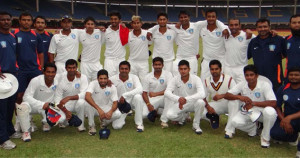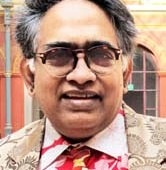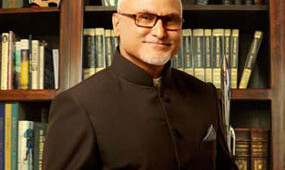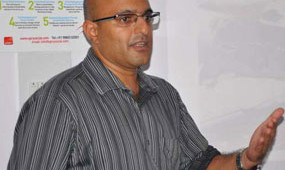By Benedict Paramanand
 The Karnataka cricket team’s stupendous win, in all forms of the game in 2014, has left everyone wondering what really went right. How did this remarkable turnaround happen? It’s more intriguing because, despite many legends in the team before, the state had not won a major tournament since 1996.
The Karnataka cricket team’s stupendous win, in all forms of the game in 2014, has left everyone wondering what really went right. How did this remarkable turnaround happen? It’s more intriguing because, despite many legends in the team before, the state had not won a major tournament since 1996.
“Lots of interesting factors,” says coach J Arun Kumar with a grin. “They exactly knew what I wanted them to do. From day one I told the boys that I want professionalism; cricket is not a hobby.”
The big motivating factor for the boys was that many of them have been aspiring to play for the national team. “That made things easier for me,” he says. But that’s not enough for a team to stage such a turnaround. It needs astute leadership and impact coaching for building a formidable team.
Much like a business organization, despite talent the boys are often short of translating that into high performance due to self-doubts and the way the team management engages them. “When they doubted their abilities I reassured them that I had full confidence in them, which I did. I knew everyone personally. I get into a mental level with them and make sure that I am confident about them. Once you gain their trust, they will give you 100 percent.”
Unlike many Indian state teams players from Karnataka take their studies seriously as well. “One big advantage is that these boys are well educated and they are mature and smart and you can’t fool them (easily). So, it’s better to be honest from day one which I was.”
In business organizations too the average age of senior management is dropping significantly. This trend is driving the performance of the middle management which has significant experience but needs the extra drive to sustain its edge. The Karnataka team management too brought in young blood like Lokesh Rahul, Ravikumar Samarth, H S Sharath two years ago to enhance the performance of highly talented and experienced players like Vinay Kumar, Robin Uttappa, C Gautam, Manish Pandey and Mayank Agarwal. “The energy of the young boys rubs off on the others.”
Once that’s done, the coaches were very clear on the key team building secret – camaraderie. “We make sure the team is together, it’s very important. Team bonding is really good. The team often met in each other’s houses to relax.” What also worked well is the bonding Arun Kumar has had with his bowling coach Mansur Ali Khan. Both played for Karnataka together in the 1990s – one a flamboyant opener and the other a medium pace bowler. Their bonding goes back to their early cricketing days when they were roommates. The boys call them Jak (J Arun Kumar) and MAK which shows the informality in the way the team works. JAK has captained Karnataka as well.
Although the roles of the two coaches are defined they work as a team. “It’s not like I did not talk to the bowlers, Vinay is a bowler. It was never like bowling or batting coach, we were two coaches in a team, helping each other out.”
Even bankers can inspire
A banker inspiring anyone is rare. But Arun Kumar credits his peoplemanagement skills to his dad, a banker with a public sector bank. “I used to watch dad during my schools days while waiting in his cabin before we drove home. The way he handled his stress, the way he delegated, the way he encouraged others. I used to observe how he talked to people; how he got things done.”
Having legends around you can be good and bad. India’s spin legend Anil Kumble and fast bowler Javagal Srinath, who ran the Karnataka State Cricket Association in the last tenure, recruited the JAK and MAK duo from seven prospects. The duo didn’t have much to show in terms of experience but their passion and keenness to deliver results got them the break. Their gamble worked.
The other piece of the puzzle is the role of captain Vinay Kumar. “Vinay is an added bonus to me. Whatever you say off the field you need somebody to carry it into the field. Vinay did a fantastic job. He did all the execution. Execution was brilliant.
Even if winning is the goal of every team, no one takes the responsibility for the loss. An important factor for this team’s success, the coach says, is because every player knew his responsibility. “Give the boys the responsibility because if you try to dictate terms it does not happen nowadays. The boys got together and they decided what to do. When every team does that, it becomes a winning team. You should reach a stage when you don’t need a coach, give them ideas on how to be responsible, how to take decisions and then be accountable.”
Sustaining Success
There was no pressure on this team when it went on to achieve its recent success because no one expected much from them. They went on to win not only the Ranji Trophy, the most important tournament between the states, but also the Irani Trophy (between the winner of Ranji Trophy and rest of India) and the one-day international. Now that the team has done it, pressure will be on from now. That’s when the other elements kick in. “I have started preparing them about how to handle pressure, how to manage expectations, among others. The only way to do this is keep it simple, take one game at a time, get the basics right and once you do that things fall into place. The boys should be confident and the coach should make sure of that. Only if you believe in the team you can do that.
Arun Kumar has learnt from his former coach Raghunath the value of not getting too technical and keeping things very easy in the dressing room. “Before we had to sort out our own techniques, and then I realized we started using our own brains. I want this team too to think on its own. Once they are responsible, they are accountable.”
It’s becoming more evident in business as well as sports that highly motivated teams with unobtrusive bosses are more successful than teams with star performers and famous coaches.











Recent Comments